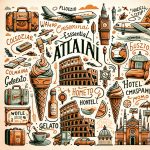Traveling in Italy can be an incredible experience, but being able to communicate with the locals can make it even more memorable. Learning some key Italian phrases is essential for any traveler venturing to the land of pizza and pasta. Whether you’re ordering a delicious meal at a charming trattoria or asking for directions to a famous landmark, knowing even a few basic Italian phrases can greatly improve your overall travel experience.
When traveling in a foreign country, language barriers can often lead to confusion and frustration. However, by learning some common Italian greetings and basic phrases, you can easily break down those barriers and connect with the locals on a deeper level. Saying “Buongiorno” (Good morning) or “Ciao” (Hello/Goodbye) with genuine enthusiasm will instantly bring a smile to the faces of Italians. And expressing gratitude by saying “Grazie” (Thank you) will ensure that you receive warm hospitality wherever you go.
Ordering food and drinks is another crucial aspect of any travel experience, especially in Italy where culinary delights abound. Mastering some essential phrases like “Posso avere un caffè, per favore?” (Can I have a coffee, please?) or “Mi consiglia un piatto tipico?” (Can you recommend a local dish?) will not only impress the waitstaff but also enhance your enjoyment of authentic Italian cuisine. So grab your phrasebook and get ready to savor every bite like a true Italian.
By learning Italian phrases, you not only gain practical skills for navigating through busy streets and finding hidden gems but also show respect for the culture and customs of Italy. When faced with unexpected situations or emergencies, having the ability to seek help by saying “Ho bisogno di un dottore” (I need a doctor) or “Mi hanno rubato il portafoglio” (My wallet has been stolen) could make all the difference.
Italians are known for their warmth and friendliness, and by making an effort to communicate in their native language, you are sure to receive their genuine assistance and hospitality.
Common Italian Greetings and Basic Phrases
When traveling to Italy, it’s important to have some basic Italian phrases in your repertoire to help you navigate and communicate with the locals. Even if you only know a few key phrases, it can make a significant difference in your overall travel experience. In this section, we will provide you with a list of essential greetings and basic phrases to help you get started.
The most common greeting in Italian is “Buongiorno,” which means “Good morning” or “Good day.” It is customary to use “Buongiorno” until around 5 p.m., after which you can switch to using “Buonasera” for “Good evening.” For a more casual greeting, you can simply say “Ciao,” which means both “Hello” and “Goodbye”.
Another important phrase to know is “Grazie,” which means “Thank you.” It’s always polite to express gratitude when someone helps you or provides a service. Similarly, when someone says thank you to you, you can respond with “Prego,” which means “You’re welcome.”.
In addition to greetings and expressions of gratitude, there are also some useful basic phrases that can come in handy while traveling in Italy. For example, if you need to get someone’s attention or ask for forgiveness for interrupting, saying “Mi scusi” (Excuse me) is appropriate. And if someone offers their assistance or serves something to you, responding with a polite “Prego” is an appropriate way of accepting.
By familiarizing yourself with these common greetings and basic phrases before your trip, navigating through Italy will become much smoother. Additionally, the locals will appreciate your effort to speak their language and may be more willing to help you along the way. So don’t hesitate to learn these essential Italian phrases-it’s the first step towards embracing the rich culture of Italy.
Ordering Food and Drinks in Italian
When traveling in Italy, one of the most enjoyable aspects is indulging in the delicious cuisine. To fully experience the country’s culinary delights, it is essential to know how to order food and drinks in Italian. By mastering a few key phrases, travelers can confidently navigate menus, ask for recommendations, and savor their meals with ease.
Basic Phrases
To begin with, it’s important to have some basic phrases for ordering food and drinks. One of the simplest ways to start your meal is by saying “Posso avere un caffè per favore?” (Can I have a coffee, please?). This phrase can be used at cafes or even after a meal when you want to enjoy a classic Italian espresso.
Additionally, if you are unsure of what to order from the menu and would like some assistance, you can politely ask a server or waiter “Mi consiglia un piatto tipico?” (Can you recommend a local dish?). This shows your interest in trying authentic Italian cuisine while seeking guidance from someone who knows it best.
Dietary Requests
Italy is known for its diverse culinary options, which caters to different dietary preferences or restrictions. If you have any specific dietary requests or allergies, it’s crucial to communicate them effectively while ordering at restaurants. One useful phrase to remember is “Ho una dieta senza glutine” (I have a gluten-free diet), which can be helpful if you are gluten intolerant.
Similarly, if you are vegetarian or vegan, you can say “Sono vegetariano/vegano” (I am vegetarian/vegan) and ask if there are any suitable options on the menu. It’s always recommended to inform the staff about your dietary needs so that they can provide appropriate recommendations or make necessary adjustments.
Special Requests and Customizations
In addition to dietary requests, you may also have specific preferences or customizations for your meal. Italians take pride in their cuisine and are usually accommodating when it comes to personalizing dishes. To make special requests, you can use phrases such as “Senza aglio” (Without garlic), “Con poco olio” (With a little oil), or “Più piccante” (More spicy).
It’s important to note that while Italians are usually accommodating, certain traditional dishes might not be open to modifications. In such cases, it is advisable to respect the culinary heritage and enjoy the dish as it is originally intended.
By familiarizing yourself with these essential phrases for ordering food and drinks in Italian, you can confidently explore Italy’s gastronomic offerings and have a truly authentic dining experience. Remember, immersing yourself in the local culture enhances your overall travel experience and creates lasting memories of your time in Italy.
Asking for Directions and Navigating
When traveling in Italy, it is important to know how to ask for directions and navigate your way around. Whether you are looking for a specific tourist attraction or trying to find the nearest train station, knowing some key phrases will help you get to your destination with ease.
One common phrase that you will find useful is “Dov’è la stazione?” which means “Where is the train station?”. This phrase can come in handy when you are trying to catch a train or need to get back to your accommodations. Another useful phrase is “Come arrivo a ?” which means “How do I get to ?”. You can use this phrase when asking for directions to a specific location or landmark.
To understand responses and directions, it’s helpful to learn some common vocabulary related to navigating. The word for “left” in Italian is “sinistra” while “right” is translated as “destra”. If someone tells you to go straight, they might say “vai dritto”. It’s also important to know the words for street (“strada”) and square (“piazza”) as these are often used when giving directions.
| Italian | English |
|---|---|
| Dov’è la stazione? | Where is the train station? |
| Come arrivo a ? | How do I get to ? |
| Sinistra | Left |
| Destra | Right |
| Vai dritto | Go straight |
| Strada | Street |
| Piazza | Square |
By familiarizing yourself with these phrases and vocabulary, you will be able to confidently ask for directions and navigate your way through Italy. Remember to always be polite and patient when interacting with locals, as they will be more likely to help you. With a little knowledge of Italian and a willingness to explore, you’ll find that getting around Italy is an enjoyable part of your travel experience.
Shopping and Bargaining in Italian
Communicating while Shopping
When traveling in Italy, shopping is often a fun and exciting part of the experience. Whether you’re browsing through charming local boutiques or exploring bustling markets, knowing some Italian phrases can greatly enhance your shopping interactions. Start by learning basic greetings like “Buongiorno” (Good morning) or “Buonasera” (Good evening) to politely acknowledge the shopkeeper. When entering a store, don’t forget to say “Permesso” (May I come in?) as a sign of respect.
Once inside, it’s important to know how to ask for assistance or inquire about prices. A useful phrase to remember is “Posso aiutarla?” (Can I help you?), which signals to the shopkeeper that you need their assistance. If you’re interested in knowing the price of an item, ask “Quanto costa?” (How much does it cost?). This simple question will allow you to gather information without committing to a purchase.
Bargaining Techniques
In certain situations, bargaining is a common practice in Italy. However, it’s essential to approach it with cultural sensitivity and respect for local customs. When attempting to negotiate the price of an item, use phrases like “Posso avere uno sconto?” (Can I have a discount?) or “Mi fa uno sconto?” (Can you give me a discount?). Remember to maintain a polite and friendly demeanor throughout the interaction.
Keep in mind that not all shops or markets may be open to bargaining, especially those that primarily cater to tourists. It’s best to gauge the situation and follow the lead of locals. If bargaining is not appropriate, don’t push it and simply accept the stated price gracefully.
Cultural Considerations
Italian shopkeepers appreciate when customers take an interest in their products and show genuine enthusiasm. Complimenting their selection or saying “Mi piace molto” (I really like it) can create a positive atmosphere. Additionally, it’s customary in Italy to greet the shopkeeper with “Arrivederci” (Goodbye) before leaving, even if you haven’t made a purchase.
Remember, shopping in Italy is not just about the transaction; it’s an opportunity to engage with locals and understand their culture. Embrace the experience with an open mind and enjoy the unique charm of Italian shopping.
Emergency Situations
In any travel situation, it is always important to be prepared for emergencies. While we hope that you never find yourself in a situation where you need help, it’s crucial to know how to seek assistance if the need arises. This section will provide you with some essential Italian phrases for seeking help during emergency situations.
If you find yourself in need of medical assistance, knowing how to ask for a doctor or medical professional can be a lifesaver. “Ho bisogno di un dottore” translates to “I need a doctor” and can be used when seeking medical attention. Another phrase that may come in handy is “Mi sento male” which means “I feel sick.” These phrases will allow you to communicate your needs and get the necessary help as quickly as possible.
In case of theft or other similar incidents, it’s vital to know how to report the incident and seek assistance from the authorities. A useful phrase to remember is “Mi hanno rubato il portafoglio,” which means “My wallet has been stolen.” This phrase can be used when filing a police report or seeking help from law enforcement. Additionally, learning numbers in Italian can also prove helpful when providing important information such as phone numbers or addresses.
It’s important to remain calm and composed during emergency situations, as panicking may hinder effective communication. Knowing these essential phrases will enable you to seek prompt assistance and ensure your safety while traveling in Italy. However, it is also recommended that you carry emergency contact information with you at all times and familiarize yourself with local emergency services before your trip. Being prepared for emergencies will bring peace of mind throughout your travels in Italy.
Cultural Etiquette and Politeness
In an unfamiliar country, it is crucial to familiarize yourself with the cultural etiquette and politeness norms of the locals. This section will provide travelers with a guide on Italian cultural etiquette and useful phrases for expressing gratitude, making apologies, and other gestures of politeness.
When interacting with Italians, it is important to remember that they place a significant emphasis on manners and courtesy. Saying “thank you” and “please” can go a long way in creating a positive impression. Here are some essential phrases for expressing gratitude in Italian:
1. “Grazie mille” – Thank you very much 2. “La ringrazio tanto” – I thank you so much 3. “Ti ringrazio di cuore” – I sincerely thank you Italians also have certain customs when it comes to apologizing or asking for forgiveness. If you find yourself in a situation where an apology is necessary, consider using these phrases:
1. “Mi scuso” – I apologize 2. “Mi dispiace molto” – I’m very sorry 3. “Perdonami/perdonatemi” – Forgive me It’s also good to know how to politely excuse yourself or ask for permission in various situations. Here are some commonly used polite phrases:
- “Mi scusi” – Excuse me (formal)
- “Permesso” – Excuse me (to pass through)
- “Posso disturbarti un attimo?” – May I bother you for a moment?
- 1.”Mi scusi se il mio italiano non è molto fluente” – Excuse me if my Italian is not very fluent.
- 2.”Non parlo italiano molto bene” – I do not speak Italian very well.
- 3.”Mi piacerebbe imparare l’italiano” – I would like to learn Italian.
Lastly, when engaging with locals, it can be helpful to mention that you’re not fluent in Italian but are making an effort to learn the language. This gesture is often appreciated by Italians and shows respect for their culture and language diversity.
By understanding and using these cultural etiquette phrases, travelers can foster positive interactions with locals and create memorable experiences while exploring Italy. Embracing the language and culture of Italy will undoubtedly enhance your travel experience in this beautiful country.
Useful Expressions and Proverbs
Learning useful expressions and proverbs in Italian can greatly enhance your understanding of the language and culture. These phrases go beyond basic greetings and can help you connect with locals on a deeper level. Here are some common expressions and proverbs that you can add to your repertoire:
- “In bocca al lupo.” – This expression is used to wish someone good luck, similar to the English phrase “break a leg.” It literally translates to “in the mouth of the wolf” and the appropriate response is “Crepi il lupo.” which means “May the wolf die.”
- “Chi dorme non piglia pesci” – This proverb translates to “You snooze, you lose.” It emphasizes the importance of taking action and not being idle if you want to achieve something.
- “Meglio tardi che mai” – This expression means “Better late than never.” It encourages patience and reminds you that it’s better to start or finish something late rather than not at all.
- “Non avere peli sulla lingua” – Literally translating to “not having hairs on your tongue,” this phrase means to speak one’s mind directly without holding back.
- “L’abito non fa il monaco” – This proverb means that appearances can be deceiving. It highlights the idea that clothing does not determine one’s true character or abilities.
These expressions and proverbs provide insights into Italian culture, history, and ways of thinking. By incorporating them into your conversations, you show interest in local customs and traditions, further enriching your travel experience in Italy.
To reinforce your learning, take note of these expressions, practice saying them out loud, and try using them in conversations while traveling. Locals will appreciate your efforts to learn their language and will likely respond with enthusiasm, making for more memorable interactions during your trip.
Overall, adding useful expressions and proverbs to your Italian language skills will not only help you communicate more effectively but also deepen your understanding of Italy’s rich culture and heritage. So, embrace these linguistic gems and allow them to enhance your travel experience in every way possible.
Conclusion
In conclusion, learning basic Italian phrases is essential for travelers visiting Italy. By familiarizing yourself with common greetings, ordering food and drinks, asking for directions, shopping, and navigating emergency situations, you can enhance your overall travel experience and make meaningful connections with locals.
Embracing the Italian language and culture goes beyond just communicating effectively during your trip. It allows you to immerse yourself in the beauty of Italy and truly appreciate its rich history and traditions. Whether it’s learning useful expressions and proverbs or understanding cultural etiquette and politeness norms, taking the time to appreciate the nuances of the Italian language can deepen your connection to the country.
Additionally, interacting with locals in their native language shows respect and appreciation for their culture. Italians are known for their warmth and hospitality, and making an effort to communicate in Italian can open doors to new friendships and experiences that may not have been possible otherwise. So don’t be afraid to step out of your comfort zone, practice your Italian phrases, and embrace the language during your travels in Italy.
Overall, by embracing the Italian language and culture, you’ll not only improve your communication skills but also gain a deeper understanding of this beautiful country. So take the time to learn some key Italian phrases before your trip – whether it’s mastering greetings or understanding common expressions – as it will undoubtedly enhance your travel experience in Italy. Buon viaggio.
Frequently Asked Questions
What do you say to someone traveling in Italy?
When encountering someone who is traveling in Italy, it is common to greet them with a warm “Buongiorno” or “Buonasera,” depending on the time of day. These phrases mean “Good morning” and “Good evening” respectively. It is also polite to ask if they speak English by saying, “Parli inglese?”
which means “Do you speak English?” This shows a willingness to communicate and helps establish a common language for conversation. Offering assistance or asking if they need any recommendations for places to visit can also be appreciated gestures to extend a friendly welcome.
What are some popular Italian phrases?
Italian is renowned for its beautiful and expressive language, and there are several popular phrases that have made their way into everyday conversation, even beyond Italy’s borders. One such phrase is “Ciao bella/bello,” which means “Hello beautiful/handsome.” It’s often used as a casual greeting among friends or acquaintances.
Another commonly heard phrase is “Grazie mille,” which translates to “Thank you very much.” Italians appreciate politeness, so expressing gratitude using this phrase can go a long way. Additionally, saying “Mi scusi” meaning “Excuse me” when trying to get someone’s attention or navigating through crowded areas is considered respectful.
What are some beautiful Italian sayings?
The Italian language has an array of beautiful sayings that encapsulate sentiments of love, wisdom, and life itself. One particularly beloved Italian saying is “L’amore vince tutto,” which means “Love conquers all.” This sentiment highlights the belief that love has the power to overcome any obstacle or challenge in life.
Another popular Italian saying that pertains to life and taking risks is “Chi non risica non rosica,” which translates to “Who doesn’t take risks, doesn’t gnaw.” This expression encourages individuals to be bold and embrace chances as it implies that those unwilling to take risks won’t reap rewards. Finally, the saying “La dolce vita” meaning “The sweet life,” is an iconic phrase that represents the Italian way of enjoying life’s pleasures and reveling in a carefree existence.

I’m a passionate traveler, writer, and Italophile. My fascination with Italy’s history, art, and culture has led me on countless adventures across the Italian landscape. Through “I Live Italy,” I share my love for this extraordinary country and aims to inspire others to explore its boundless beauty.





